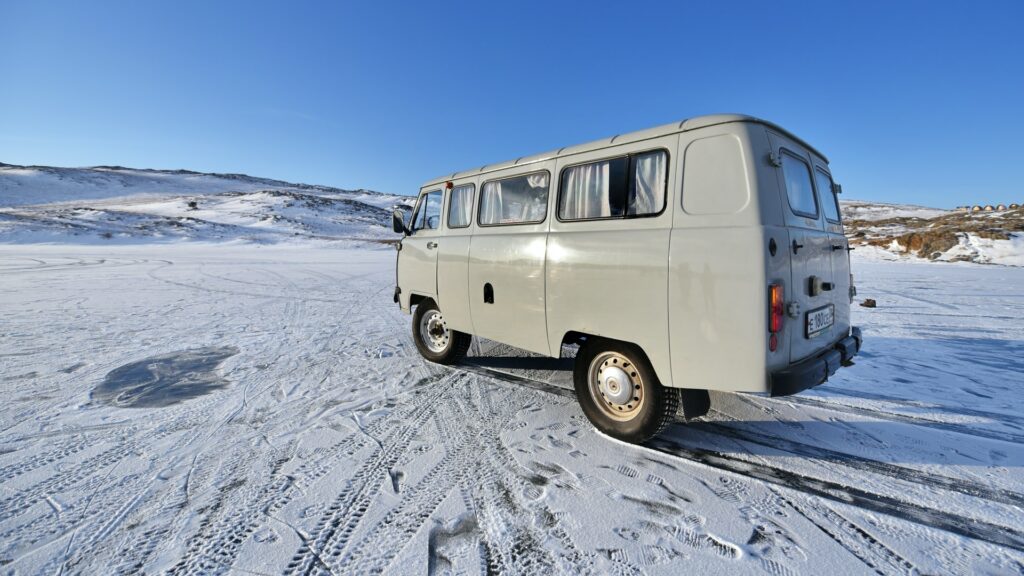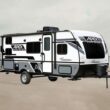Table of Contents Show
Even if you head south for the winter, the temperatures can still fall below freezing for a short time. Keep an eye on the temperatures when you’re in an RV. An RV one-night freeze isn’t likely to cause significant damage to your RV, especially if you know how to handle them.
Today, we’re looking at some things you should consider doing if you’re expecting temperatures to plummet while in your RV. Let’s get started!
How Cold Does It Need to Be for RV Pipes to Freeze?
Water cannot freeze until it drops below 32 degrees Fahrenheit. However, just because the outside temperature is below zero doesn’t mean your RV pipes will freeze. The amount and quality of an RV’s insulation directly impact an RV’s ability to withstand freezing temperatures.
Most RVs can withstand temperatures in the low 20s without frozen pipes. However, some RVs can withstand one-night freezing in the teens and even single digits without their pipes freezing. Keeping the inside of your RV warm can drastically improve your chances of avoiding frozen pipes.

Pro Tip: Insulation is crucial for comfortably camping in the cold. Check out our guide to RV insulation and staying warm!
How Long Does It Take for Pipes to Freeze in an RV?
The further below freezing the temperature drops, the faster an RV’s pipes will freeze. It would take approximately 24 hours for you to start experiencing frozen pipes in your RV if the temperature were to hover right at 32 degrees. However, your pipes can freeze in a matter of hours if the temperatures quickly drop below 20 to 25 degrees, and your RV isn’t well equipped to handle the temperature.
Your RV’s furnace and other heating resources can keep the temperature above freezing around your water lines and prevent them from freezing. Heating resources can buy you some time for the sun and temperatures to rise. You’re more likely to experience frozen pipes when the high temperatures for the day stay at or below freezing.
Will RV Holding Tanks Freeze?
The holding tanks on your RV can freeze, but it will take some time. Large volumes of water take longer to freeze. RVs in extreme cold temperatures for consecutive days can result in frozen RV holding tanks. RVs rated for four seasons will likely have tank heaters to prevent them from freezing.
How Do I Prepare My RV for a One-Night Freeze?
We’ve learned a few tips and tricks when camping in colder weather. Here are a few things you should do to prepare your RV for freezing temperatures.
1. Disconnect Your Water Hose
If you’re in a campground, the staff will likely require you to disconnect your water hose. This not only helps protect you from a frozen water hose but also the water spigot.
If water freezes inside the water connection, it can cause permanent damage to the connection. Campgrounds will often require guests to use a heated hose or disconnect from the connection to avoid damage to the system.
Not having a heated water hose just means you’ll need to fill up your RV’s freshwater tank. This ensures you don’t find yourself without water in your RV.
Keep in mind that this means you no longer have a seemingly infinite supply of water. Managing your water usage will be necessary, especially if you’re looking at consecutive days of cooler weather.
2. Ensure Your Sewer Hose Is Empty
Sewer hoses are typically very thin and have minimal protection from cold temperatures. Any liquids inside them are likely to freeze during sub-freezing temperatures. Getting all the liquids out of your sewer hose lets you dump your tanks even during freezing weather.
When you expect freezing temperatures, don’t allow water to sit in your sewer hose after dumping your tanks. Many RVers will even pack up and store their sewer hoses to minimize their exposure to RV one-night freezing temperatures.
Pro Tip: Here are 10 sanitary ways to store your RV sewer hose →

3. Turn On Your Tank Heaters
Some RVs come with heaters that act like electric blankets for your RV’s water tanks. With the simple flick of a switch, you can protect your water tanks from freezing. These warmers typically use minimal power and offer tremendous protection. Depending on the temperature, they often have sensors that will turn them on and off.
4. Keep Your Wetbay or Underbelly Warm With a Light Bulb
Your underbelly and storage compartments house practically all of the sensitive components of your water system. While some units pump warm air into the underbelly to protect these components, this is sometimes not enough. Using 40 to 100-watt light bulbs can generate adequate heat to keep them safe.
Make sure you’re not placing your lightbulb too close to plastic or anything that could cause a fire. Using an indoor/outdoor thermometer allows you to keep an eye on the temperature in your under-storage. This helps you know whether the lightbulb is doing a good enough job keeping your water components safe.
5. Keep Interior Warm With a Heater
Whether you’re staying in your RV or not, keeping the interior warm provides a tremendous amount of protection. You can use electric heaters in your RV, but be careful not to overload your electrical system. These units use a considerable amount of electricity, and you’ll likely need to run them for hours at a time.
Ensure your furnace regularly runs, especially if your RV pumps warm air from your furnace into the underbelly. If you’re strictly using an electric space heater, the temperature in your underbelly could reach unsafe levels for your water lines. So, make sure it’s kicking on often and pumping heat to prevent an RV one-night freeze and keep your entire RV nice and toasty.
How Do I Keep My RV Water Hose From Freezing?
A standard water hose provides minimal protection during cold weather. There’s very little insulation for a standard hose, and it’s likely to freeze when the temperatures drop below freezing. Campgrounds typically require guests to disconnect their water hoses when they expect freezing temperatures.
Another option to consider is buying a heated hose. These are relatively expensive but necessary if you’re planning to spend time doing some cold weather camping. You can typically find these available online or often in limited quantities in RV supply stores.

Pro Tip: If cold weather is imminent on your next adventure, invest in one of these top 5 heated RV water hoses →
Beat a One Night Freeze With These Tips
Preparation is key to protecting your RV from a one-night freeze. It can be too late if you wait to take action until the temperatures start to drop. By following these tips, you can avoid damage to your RV and have a toasty RV.
What are your tips and tricks for enduring freezing temperatures in your RV?






